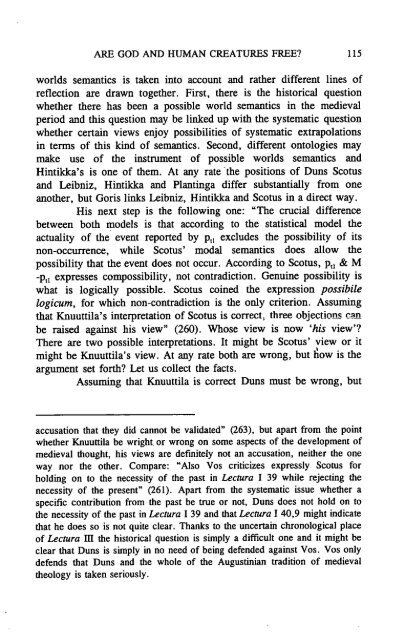Jaarboek Thomas Instituut 1997 - Thomas Instituut te Utrecht
Jaarboek Thomas Instituut 1997 - Thomas Instituut te Utrecht
Jaarboek Thomas Instituut 1997 - Thomas Instituut te Utrecht
Create successful ePaper yourself
Turn your PDF publications into a flip-book with our unique Google optimized e-Paper software.
ARE GOD AND HUMAN CREATURES FREE? 115<br />
worlds semantics is taken into account and rather different lines of<br />
reflection are drawn together. First, there is the historical question<br />
whether there has been a possible world semantics in the medieval<br />
period and this question may be linked up with the sys<strong>te</strong>matic question<br />
whether certain views enjoy possibilities of sys<strong>te</strong>matic extrapolations<br />
in <strong>te</strong>rms of this kind of semantics. Second, different ontologies may<br />
make use of the instrument of possible worlds semantics and<br />
Hintikka's is one of them. At any ra<strong>te</strong> 'the positions of Duns Scotus<br />
and Leibniz, Hintikka and Plantinga differ substantially from one<br />
another, but Goris links Leibniz, Hintikka and Scotus in a direct way.<br />
His next s<strong>te</strong>p is the following one: "The crucial difference<br />
between both models is that according to the statistical model the<br />
actuality of the event repor<strong>te</strong>d by Pu excludes the possibility of its<br />
non-occurrence, while Scotus' modal semantics does allow the<br />
possibility that the event does not occur. According to Scotus, PIl & M<br />
-PIl expresses compossibility, not contradiction. Genuine possibility is<br />
what is logically possible. Scotus coined the expression possibile<br />
logicum, for which non-contradiction is the only cri<strong>te</strong>rion. Assuming<br />
that Knuuttila's in<strong>te</strong>rpretation of Scotus is correct, three objection~ can<br />
be raised against his view" (260). Whose view is now 'his view'?<br />
There are two possible in<strong>te</strong>rpretations. It might be Scotus' view or it<br />
might be Knuuttila's view. At any ra<strong>te</strong> both are wrong, but llow is the<br />
argument set forth? Let us collect the facts.<br />
Assuming that Knuuttila is correct Duns must be wrong, but<br />
accusation that they did cannot be valida<strong>te</strong>d" (263), but apart from the point<br />
whether Knuuttila be wright or wrong on some aspects of the development of<br />
medieval thought, his views are defini<strong>te</strong>ly not an accusation, neither the one<br />
way nor the other. Compare: "Also Vos criticizes expressly Scotus for<br />
holding on to the necessity of the past in Lectura I 39 while rejecting the<br />
necessity of the present" (261). Apart from the sys<strong>te</strong>matic issue whether a<br />
specific contribution from the past be true or not, Duns does not hold on to<br />
the necessity of the past in Lectura I 39 and that Lectura I 40,9 might indica<strong>te</strong><br />
that he does so is not qui<strong>te</strong> clear. Thanks to the uncertain chronological place<br />
of Lectura m the historical question is simply a difficult one and it might be<br />
clear that Duns is simply in no need of being defended against Vos. Vos only<br />
defends that Duns and the whole of the Augustinian tradition of medieval<br />
theology is taken seriously.








